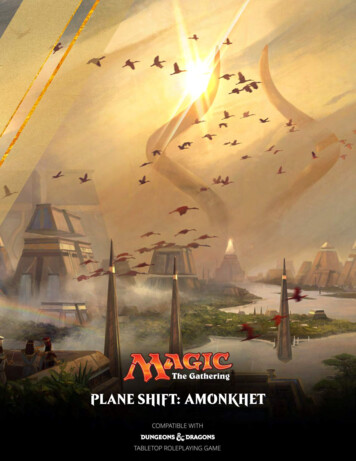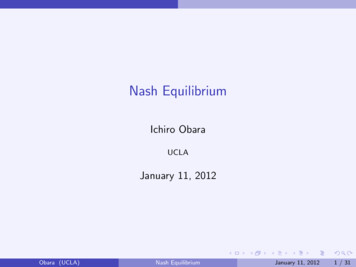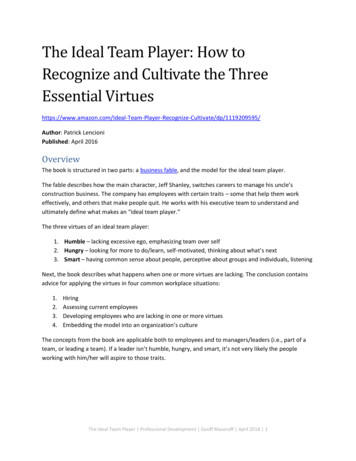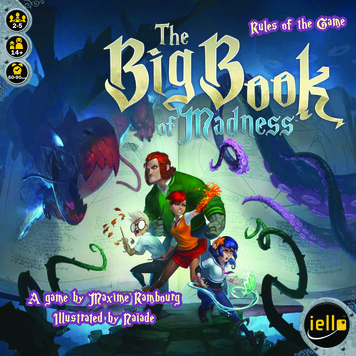
Transcription
ContentsThe World of AmonkhetRaces of AmonkhetTrials of the Five GodsAn Amonkhet BestiaryAppendix: Planeswalkersand the MultiversePLANE SHIFT: AMONKHET 2017 Wizards of the Coast LLC. Magic: The Gathering,Wizards of the Coast, Dungeons & Dragons, their respective logos, Magic, Amonkhet, D&D, Player’s Handbook,Dungeon Master’s Guide, Monster Manual, and characters’distinctive likenesses are property of Wizards of the CoastLLC in the USA and other countries. All rights reserved.www.MagicTheGathering.comWritten by James Wyatt with Ashlie HopeCover art by Titus LunterEditing by Scott Fitzgerald GrayThe stories, characters, and incidents mentioned in thispublication are entirely fictional.This book is protected under the copyright laws of the UnitedStates of America. Any reproduction or unauthorizeduse of the material or artwork contained herein isprohibited without the express written permissionof Wizards of the Coast LLC.First Printing: July 2017Contact Us atWizards.com/CustomerServiceWizards of the Coast LLCPO Box 707Renton, WA 98057-0707 USAUSA & Canada: (800) 324-6496or (425) 204-8069Europe: 32(0) 70 233 277AmonkhetAleksi Briclot
IntroductionThis whole Plane Shift thing started because of Zendikar. It’shard to imagine a Magic plane better suited for D&D adventuring than the one that was conceived, from start to finish,as “adventure world.” Making the transition from The Art ofMagic: The Gathering—Zendikar to Plane Shift: Zendikarwas thus perfectly natural.Innistrad came next, bolstered by the happy coincidenceof the Curse of Strahd adventure coming out close to thesame time. Then with Plane Shift: Kaladesh, I got to straya little further from the core D&D experience, presenting afairly fast and loose take on reskinning D&D magic itemsinto the aether-powered inventions of Kaladesh.And now we come to Amonkhet—a desert plane inspired by ancient Egypt, ruled by an evil dragon Planeswalker, and which features one small safe haven from an undeadinfestation. It is not a traditional D&D setting.The trials of the five gods provide the most obviousstructure for a campaign set on Amonkhet. A group of initiates from the same crop might go through the trials together,and those trials alone could form the entirety of a short campaign. To flesh out the experience, characters could also undertake missions on the behalf of gods or viziers: defendingthe Hekma, joining the gods on a hunting expedition in thedesert, and so on. The campaign could get complicated withthe addition of viziers, who normally do not go through thetrials (unless they choose to), or if any or all of the charactersbecome dissenters.Perhaps the best way to think of an Amonkhet campaign is that it takes place against the backdrop of the fivetrials, rather than being all about the trials. The trials providea structure and a sense of drama, but relationships amongcharacters—and between characters and the rest of theworld—are where the meat of the story unfolds. You couldset your campaign in the period leading up to when initiateplayer characters undergo one of the trials, with the trial asa climax to the whole story. You could use the Trial of Solidarity and the Trial of Ambition as a framing device for thecampaign, to explore issues of collective unity versus personal achievement. (Initiate characters would undergo theTrials of Knowledge and Strength on their own terms.) Oryou could ignore the trials entirely and focus on dissentercharacters trying to upset the social order of Naktamun.As always, The Art of Magic: The Gathering—Amonkhet is the definitive resource for information about the plane.With this document, you can use that information to builda campaign with a minimum of changes to the fifth editionD&D rules, which you can find here. And even without thebook, you can find lore about Amonkhet on the Magic website.Good luck in the trials!—James WyattThe game mechanics in this supplement are usable in your D&D campaign but are not fullytempered by playtests and design iterations. For these reasons, material in this supplement isnot legal in D&D Organized Play events.Hieroglyphic IlluminationRaoul Vitale
IslandChristine Choi
The WorldTowering, gold-encrusted monuments break the unending monotony of a horizon formed of sun-blastedsand. Awe-inspiring, animal-headed gods walk amongthe people, offering them care and protection from thehorrors of the desert. A wide, life-giving river offers itsabundant bounty, providing for every physical need.Happy, hopeful people offer sacrifices in grand temples dedicated to their benevolent gods, addressingtheir spiritual needs. For they know that this life, aswonderful as it might be, is just the beginning—a prelude to the perfection that awaits them in the afterlife,promised to them by their God-Pharaoh.Amonkhet is a plane of dichotomy. Beyond thelush river valley spreads endless scorching desert. Accursed, desiccated mummies roam that desert, whilecarefully embalmed mummies attend to the needs ofthe living in the glorious city-state. The people haveeverything they need. They are protected from the desert heat and wandering mummies by the magical barrier called the Hekma, and they spend their lives infocused training, honing body and mind to perfection.Yet they eagerly anticipate the time when they will bepermitted to die in combat and leave this world behind.On the surface, Amonkhet seems like a marvelousplace to live. But something unsettling and nefariouslurks behind the grand facade. The wise and benevolent God-Pharaoh, said to be busy preparing the wondrous afterlife for the worthy, is actually Nicol Bolas—the malevolent dragon Planeswalker whose schemesreach far beyond this plane. And all the preparationand training, all the trials and contests, all the effortto be made worthy—all of this is meant to prepare thepeople of Amonkhet for transformation into an undeadarmy under Bolas’s command.Sweltering SunsRaymond Swanland
Behind the FacadeUnknown to any of the plane’s inhabitants, the entiresociety of Amonkhet has been manipulated by NicolBolas, who has seized control of the world, the gods,and the magic of the plane. Bolas chose this plane forhis schemes because of the presence of a magical substance called lazotep, which interacts with the magicof necromancy in strange and powerful ways. Conveniently, he also found here a pious, structured civilization that he could easily subvert to his own purposes.Making himself the God-Pharaoh, he brought the godsthemselves under his control, and eliminated anyonewho tried to stand against him. Then he transformedthe world into a factory designed to produce a hugearmy of perfect undead soldiers—mummies embalmedin lazotep.Adapting the peculiar magic of the plane, Bolasfound a means to preserve the combat skills of the living after death. He has selected five aspects of character that he desires most in his undead soldiers, and hasbuilt the society of Amonkhet around a series of trialsdesigned to hone and perfect those aspects of body andmind. Throughout their lives, the people of the planebelieve they are drawing nearer to the promised afterlife—and at last they die in the final trial, a mass battlewith no survivors. But rather than earning a place inthe afterlife, they are instead embalmed in lazotep andstored in Bolas’s great necropolis, adding to the ranksof his undead army.The Curse of WanderingPart of the magic of Amonkhet that Bolas has beenable to exploit is a necromantic phenomenon calledthe Curse of Wandering. This naturally occurring magic causes any being who dies on the plane to rise againafter a short time, cursed with insatiable hunger andan irresistible drive to attack the living. Desiccatedmummies created by the Curse of Wandering fill thedesert wasteland that dominates the plane, constantlythreatening what little life remains. But the people ofAmonkhet do not fear the threat of attack as much asthey dread the knowledge that all who live will oneday die and fall under the same curse. Death under theeffect of the Curse of Wandering is a terrifying afterlifefilled with endless suffering.What God-Pharaoh Nicol Bolas offers to the people of Amonkhet is an alternative to an eternity of wandering: an afterlife of glorious delights. And all theyneed to do to attain this eternal bliss is prove that theyare worthy. As such, the threat of the Curse of Wandering is a strong motivation for people to undergo thetrials of devotion that the God-Pharaoh demands.Grasping DunesDaarken
Sara WintersHonored Crop-CaptainPutting Devotion to the TestThe inhabitants of Amonkhet, mortal and divine alike,believe that the God-Pharaoh left the five gods as stewards of the populace when he departed to prepare theafterlife. While he is gone, the God-Pharaoh expectsthe people to devote their lives to proving they areworthy of this great reward. Since the afterlife will beperfect, the people who enter it must also be perfect.The gods are custodians of the path to the afterlife,established by the God-Pharaoh to purify and perfectthe people who follow that path and undergo its trials.Each god oversees one of five trials, instructing the initiates who prepare to face that trial by helping themcultivate one of the five aspects of mortal perfection.Solidarity. Oketra the True, the cat-headed god ofsolidarity, teaches that the worthy shall know and respect all others whom the God-Pharaoh deems as worthy. For in the afterlife, all will be together in purposeand in action.Knowledge. Kefnet the Mindful, the ibis-headedgod of knowledge, teaches that the worthy shall cultivate a nimble mind—one capable of perceiving thewonders beyond imagining that await in the afterlifeStrength. Rhonas the Indomitable, the cobra-headed god of strength, teaches that the worthy shall hone astrong body that can endure throughout an endless life.Ambition. Bontu the Glorified, the crocodile-headed god of ambition, teaches that the worthy shall strivefor greatness, as supremacy will be rewarded in the afterlife.Zeal. Hazoret the Fervent, the jackal-headed godof zeal, teaches that the worthy shall rush toward theafterlife with unhesitating fervor. Relentlessly, theywill rise to overcome any obstacle in the way of earning a place at the God-Pharaoh’s side.Initiates who pass one of the trials are awarded acartouche—a magical emblem they will take with themto the afterlife. The trials culminate in the Trial of Zeal,which is a combat to the death. Dying in this final battle is proof of worthiness, with a glorified death earning the initiate a place in the afterlife. The bodies of theslain are loaded onto funerary barges and sent throughthe Gate to the Afterlife. But this is not an end. Rather,it marks the beginning of the most wondrous part of aninitiate’s existence. Each looks forward to death in thefinal trial, hoping to find a glorious end at the hand of aclose friend, so that together, they can live as Eternalsin the afterlife with the God-Pharaoh. Forever.
People of NaktamunThe citizens of Amonkhet begin training for the trials ofthe five gods at a very young age. Children as young asfive years old are invited to become acolytes—the firststage of their spiritual development. An annual ceremony serves as a rite of passage for these youths, markingthe beginning of their journey toward the afterlife.After completing their training and the constructionof the obelisk that will be defended during the Trial ofSolidarity, a crop of acolytes is finally prepared to standbefore the five gods in the Ceremony of Measurement.Those who are judged worthy are asked to continuetheir journey toward the afterlife as the God-Pharaoh’sinitiates. Others are selected by individual gods to takean alternative route to the afterlife, becoming viziers inservice to the gods. But some stand in the light of thetwo suns and are deemed unworthy of either course,lacking in the virtues necessary to secure entry into theafterlife. In particular, acolytes who doubt the God-Pharaoh’s teachings or the way of life in Naktamun areculled from the crop and exiled from the city-state.Your character’s background can reflect the resultsof the Ceremony of Measurement.InitiateYou are an initiate, on the path to completing the trialsof the five gods in the hope of earning a glorified deathin the final Trial of Zeal. Some combination of yournatural aptitude, your crop’s needs, and your teachers’assessment while you were an acolyte led you to focusyour training in one particular area of specialization—hand-to-hand combat, long-range combat, or spellcasting. But only a well-rounded initiate can be called trulyworthy of the afterlife.If you are a hand-to-hand specialist, consider thebarbarian, fighter, monk, paladin, or rogue classes. Asa long-range combat specialist, you might be a fighter,a ranger, or a rogue. If you are a spellcasting specialist,you might be a bard, sorcerer, or wizard. And beyondthis initial choice, you might consider multiclassing orusing feats to round out your skills in all three areas.Skill Proficiencies: Athletics, IntimidationTool Proficiencies: One type of gaming set, vehicles(land)Equipment: A simple puzzle box, a scroll containingthe basic teachings of the five gods, a gaming set, aset of common clothes, and a belt pouch containing15 gp. If you have completed any trials before thestart of the campaign, you also have any cartouchesyou have earned.Unwavering InitiateGreg Opalinski
Feature: Trials of the Five GodsYour life is oriented around your participation in thefive trials that will determine your worthiness in theafterlife. While you prepare for and undergo those trials, you have constant access to training. A comfortableplace to live and regular meals are provided to you byservitor mummies (the anointed) under the supervisionof viziers. You can enjoy these benefits only as longas you obey the societal norms of Naktamun—training for the trials (with or without your crop), obeyingthe orders of the gods, and following the instructions oftheir viziers. If you violate these norms, you risk beingtreated as a dissenter. See “Trials of the Five Gods” formore information about undertaking the trials and theirrewards.Suggested CharacteristicsAn initiate’s life is focused on the trials, but it doesn’tneed to be all about the trials. Though some initiatesare highly focused on their training, most undergo thattraining while also experiencing joy, sorrow, love, loss,anger, jealousy, hope, faith, delight—the whole rangeof mortal emotions and experience. The afterlife mightbe a constant presence in every initiate’s mind, but it isthe culmination of a life well-lived—not a replacementfor it.d812345678d6123456d6123456d6123456Personality TraitI always have a joke on hand when the mood gets too serious.I use sarcasm and insults to keep a distance between myself andmy crop-mates, because I don’t want to get attached to them.I’ll settle for nothing less than perfection—in myself, in my cropmates, in everything.I’m so focused on the glorious afterlife that nothing in this life canshake my calm resolve.I enjoy using my skills to help those who lack those same skills.I train hard so that I can play hard at the end of the day. I fullyexpect to play even harder in the glorious afterlife, but I’m not in ahurry to get there.I’m perfectly happy letting others pick up the slack for me while Itake it easy.I’m constantly sizing up everyone around me, thinking about whatkind of opponent they’ll be in the final trial.IdealSolidarity. The thing that matters most of all is that we’re there foreach other. (Lawful)Knowledge. The world is a puzzle—a mystery waiting to be solved.(Neutral)Strength. All that matters to me is my own perfection. Leteveryone else seek that perfection in their own way. (Any)Ambition. I’m going to prove that I deserve only the best—ofeverything. (Evil)Zeal. Anything worth doing is worth throwing my whole self into.(Any)Redemption. I will train all the harder to make up for the doubt Ientertained when I was younger. (Any)BondOne of my crop-mates is my dearest friend, and I hope we will faceeach other in the final trial.I am in love with a vizier.I am particularly drawn to one of the five gods, and I want nothingmore than to win that god’s particular favor.I am more devoted to Naktamun and its people than I am to anyof the ideals of the gods.My weapon was a gift from a beloved trainer who died in anaccident.I carry a memento of my time as an acolyte, and I treasure it aboveall other things.FlawI’m easily distracted by an attractive person, which could be thedeath of me in the trials.I really wanted to be a vizier, and I’m angry at the god who didn’tchoose me.Training for a lifetime to die in the end seems like a big waste ofenergy.I’m not at all sure I’ll be able to grant a glorified death to any of mycrop-mates.I have a lasting grudge against one of my crop-mates, and each ofus wants to see the other fail.I think I’ve figured out that this world is not what it seems.Something dark is going on here.Gust WalkerJason Rainville
Shadowstorm VizierYongjae ChoiVizierYou are a vizier, a servant of your god. You performtasks that are essential to facilitating the initiates’ journey, so the gods reward you with entry into the afterlifewith the God-Pharaoh’s blessing. You hope to achievethe most honored status in the afterlife by being the bestpossible servant to your god.As a vizier, you can have any class, but you are especially likely to be a cleric, a druid (particularly if youserve Rhonas), or a paladin.Skill Proficiencies: History, ReligionTool Proficiencies: One type of artisan’s tools, onetype of musical instrumentEquipment: A set of artisan’s tools or a musical instrument (one of your choice), a scroll of your god’steachings, a vizier’s cartouche, a set of fine clothes,and a pouch containing 25 gpFeature: Voice of AuthorityYour voice is the voice of your god, at least in theory.Your job might include training and instructing initiates, and they are required to obey you. In any circum-stance, an initiate is expected to defer to your voiceand obey your commands. If you abuse this authority,though, your god might personally punish you.Suggested CharacteristicsA vizier’s characteristics strongly reflect the ideals andpersonality of the god they serve.d1012345678910Personality TraitEverything I do, I do gracefully and deliberately, and withcomplete confidence. (Oketra)Nothing can shake my rock-hard focus. (Oketra)When I am at peace, I am an oasis of perfect calm in the world.When I am roused to anger, I am an embodiment of terror.(Kefnet)I enjoy teasing acolytes and initiates with juicy tidbits ofknowledge wrapped up in fiendishly difficult puzzles. (Kefnet)I have the utmost faith in myself and my abilities. (Rhonas)I get restless when life in the city feels too tame, too safe.(Rhonas)I enjoy solitude as an opportunity to plan my victory. (Bontu)I use satire as a way to undermine the teachings of the othergods. (Bontu)I love, fight, and feast with equal zeal. (Hazoret)I think of those in my care as my family, in a way that mostpeople have trouble understanding. (Hazoret)
d6123456d6123456d6123456IdealSolidarity. The worthy must respect the worthy. In the afterlife, allwill be united in goal and action. (Oketra)Knowledge. The worthy shall cultivate a nimble mind, so as toperceive the wonders beyond imagination that wait in the afterlife.(Kefnet)Strength. The worthy shall hone a strong body that can withstandthe boundless energies of the afterlife. (Rhonas)Ambition. The worthy shall strive for greatness, for supremacy inlife leads to supremacy in the afterlife. (Bontu)Zeal. The worthy shall rush to the God-Pharaoh’s side withrelentless passion, rising to overcome every obstacle in their way.(Hazoret)Naktamun. The life of the city is ordered according to the plan ofthe God-Pharaoh, and that order must be preserved at all costs.BondMy loyalty to my companions embodies the ideal of loyalty to mygod. (Oketra)The teachings of my god are more precious to me than anypossession. (Kefnet)I would do anything to defend the temple of my god from anyharm or desecration. (Rhonas)I am committed to the service of my god—because it’s my sureticket into the afterlife. (Bontu)I love my god and never want my service to end. (Hazoret)I have a close friend or lover who is also a vizier.unwilling to kill their crop-mates in the trials. For whilethey cannot deny that the gods exist, they can deny thatthe gods are just—and can fight to prove that the dictates of an unjust god need not be obeyed. Some believe that one god (probably Bontu) has corrupted theprocess of the trials and the path to the afterlife. Otherscorrectly intuit that the God-Pharaoh did not actuallyhave the people’s best interests in mind when he ordered their society.A character who is identified as a dissenter loses thebenefit of the initiate’s or vizier’s background feature.In its place, the character gains the following feature:Feature: Shelter of DissentersIf they wish to have any hope of survival, whether hiding within the city or cast out into the desert, dissenters must help each other. You can find a place to hide,rest, or recuperate among other dissenters. They willhelp shield you from those who hunt you, possibly evenrisking their lives for you.FlawI am in love with an initiate, and I want to shield this person fromdeath in the trials.I secretly wish I had not been chosen as a vizier, so I couldparticipate in the trials as an initiate.I secretly question whether the gods care at all about us or whatwe do.A vizier of another god seeks my death in retribution for a pastinsult.I am terrified of what lies beyond the Gate to the Afterlife.I secretly believe the God-Pharaoh’s return will not bring blessingto this world.DissenterEven in the carefully constructed and curated city-stateof Naktamun, and in the presence of the five gods, somepeople rebel against the doctrines of the God-Pharaoh.They don’t challenge the existence of the gods, ofcourse, for those gods are visible nearly every day inthe streets of the city. Nor do they question the fact oflife after death, which is plain to see in the anointedmummies that surround them, as well as the maraudingmummies outside the Hekma. Rather, these dissenterssimply refuse to follow the ordained course of life thatleads to the glorious afterlife.Some dissenters are spurred by fear, not wanting tosubject themselves to a violent death in the trials (or intraining for the trials). Some are moved by conscience,Samut, Voice of DissentAleksi Briclot
Aven MindcensorJose Cabrera
HumanSoul-Scar MageSteve ArgyleOf the five humanoid races of Amonkhet, humans arethe most diverse and adaptable. Different humans trainin a wide variety of fighting styles, including those particularly favored by other races. A human mage mightuse any of the five colors of mana, while mages of otherraces focus on one of only two colors. Human viziersserve all five gods, and different human initiates excelin different trials. Humans defy trends and categorization, and opponents who face a human in one-on-onecombat can’t know what kind of fight to expect—fromthe foresight and cunning often associated with Kefnet,to a ruthlessness that emulates Bontu. At the beginningof such a fight, this uncertainty can give an edge to thehuman combatant.Once the fight has begun, of course, victory relieson different factors. But here, the human drive towardperfection once more tilts the scales in their favor. Humans are willing to go to any length, exhausting allavailable options, to reach the pinnacle of achievementand win the favor of the God-Pharaoh.Two Roads to PerfectionAs diverse as they are in most respects, the humans ofAmonkhet share a drive toward perfection. However,they approach this challenge differently. Some humansspecialize in a relatively narrow set of skills, while others seek to master a wide range.Perfection through Specialization. Humans whochoose a path of specialization often piously identifywith one of the five gods (often as a vizier), and thusfocus on one aspect of perfection. For them, the best wayto earn a place in the afterlife is to hone a single facet oftheir character to the utmost quality, and as initiates, theyhope to put that quality to use in all five trials. A mageinitiate who identifies with Hazoret might cultivate zealabove all other virtues, master spells of fiery magic tochannel that powerful emotion, and rely on raw energyand enthusiasm to get through the four trials leading upto Hazoret’s final test. An initiate dedicated to Oketra,on the other hand, relies on cooperation, solidarity, andteamwork to get through the trials—even Bontu’s Trialof Ambition, which attempts to break down such bonds.
VictoryGrzegorz RutkowskiTo Oketra’s disciple, ambition means a drive to help anentire crop of initiates achieve glory together, rather thanexalting oneself over others. Humans with this viewpointsee their chosen virtue coloring all others, and believethat the five gods offer their people a choice of whichvirtue to emulate and emphasize.Perfection through Balance. Other humans believe that true perfection lies in mastering all the virtues, without giving preference to any one over the others. They compare themselves to multifaceted stoneswhose beauty lies in the polished perfection of everyfacet. These humans are careful not to let their skills inone area outshine their other efforts, and if they growtoo accomplished in one set of skills, they set it aside toconcentrate their training on others until their abilitiesare in balance once more.Philosophically, such humans believe that thegods are five in number so as to remind the people ofAmonkhet not to focus their attention on a single god ora single virtue, but to serve the gods equally and mastertheir teachings to the same degree. Thus they hope toachieve a balanced state of perfection that will guarantee their admission into the afterlife.Combat ClassesMost human initiates focus their studies on a single specialization—hand-to-hand combat, long-range combat,or magical combat. Humans who choose hand-to-handcombat might focus with single-minded devotion onthe use of the sickle-bladed khopesh (treat as a longsword). Other hand-to-hand specialists take a broaderperspective and study the use of all weapons equally.Some humans, however, apply the idea of perfection through balance to these combat specializationsas well, fusing multiple styles together into a uniqueblend. For example, a human initiate might use spellsto shape sand into a sword or to wreathe arrows withlife-draining magic. Other initiates strike with an axein one hand while throwing smaller axes with the other,employing techniques of both hand-to-hand and longrange combat. Some humans use slings to launch fireballs, create illusory nets to restrain their opponents, orcraft their blades from solid toxins.Human TraitsThe humans of Amonkhet use the variant human traitspresented in the Player’s Handbook. This allows themgreater specialization from the very beginning of theircareers, and emphasizes the diversity of the human race.Ability Score Increase. Two different ability scoresof your choice increase by 1.Age. Humans reach adulthood in their late teens.Most human initiates have completed the trials andfound a glorious or inglorious death before they turn30. Viziers can enjoy longer service to their gods, intheory living up to a century.Alignment. Humans tend toward no particularalignment. The best and the worst are found amongthem.Size. Humans vary widely in height and build, frombarely 5 feet to well over 6 feet tall. Regardless of yourposition in that range, your size is Medium.Speed. Your base walking speed is 30 feet.Skills. You gain proficiency in one skill of yourchoice.Feat. You gain one feat of your choice.Languages. You can speak, read, and write Common and one extra language of your choice.
Combat ClassesSpellcasters are common among ibis-headed avendrawn to follow the teachings of Kefnet. Their physicalresemblance to the god of knowledge is reflected in theTah-Crop EliteRaoul VitaleAaron MillerAven have humanlike bodies, arms, and legs, alongwith birdlike wings and heads. Two distinct varietiesof aven are found in Naktamun. One has the head of ahawk or similar bird of prey, with short wings allowing fast flight. The other variety has the head of an ibisatop a long neck, with wide, angular wings better suitedto soaring. All aven have lean bodies with feathers extending from their heads down to their shoulders.Aven delight in flying above their foes, using theirsuperior mobility to confound and outpace their opponents. They love soaring through the sky as well,though the Hekma limits their altitude. Like all peopleof Naktamun, they are grateful for the Hekma’s protective magic, of course. But they keenly anticipate thehour when the God-Pharaoh will return and dissolvethe veil, letting them fly without limit in the afterlife.metal discipline, focus, and confidence for which avenspellcasters are known. They wield magic of air, wind,and sometimes water to buffet their foes, enhance theirown flight, and counter enemy attacks. Hawk-headedaven who follow the path of the mage are more likelyto learn sand-based magic that can cloud the air, blasttheir foes, or bury enemies in living dunes.Hawk-headed aven are often drawn to master techniques of long-range combat, whether the javelin that isthe preferred weapon of many, the bow, or other thrownweapons. Whatever weapon they use, aven hover andswoop in the air above the fray, seeking the opportuneCompanion of the TrialsAven
moment to strike in exactly the right place. In line withthe teachings of the god of solidarity, they often fly intight formations with other aven in their crops, supporting and protecting each other. Aven take great pride inthe precision of their attacks, relying on their keen vision and superior vantage points. They view the sharptip of a javelin or arro
Wizards of the Coast, Dungeons & Dragons, their respec-tive logos, Magic, Amonkhet, D&D, Player's Handbook, Dungeon Master's Guide, Monster Manual, and characters' . the beginning of their journey toward the afterlife. Player's Handbook.- .










